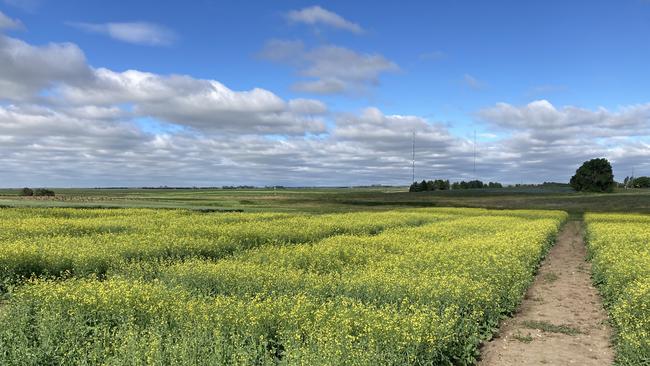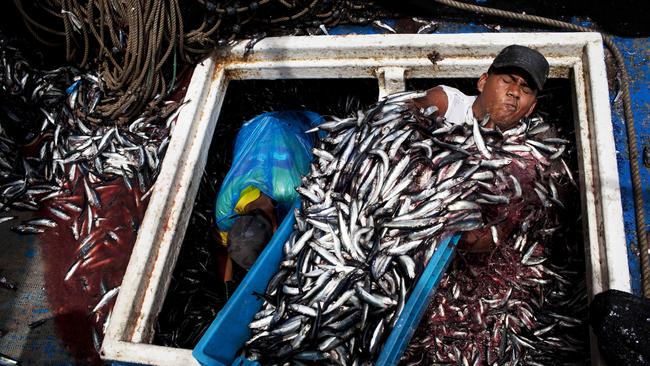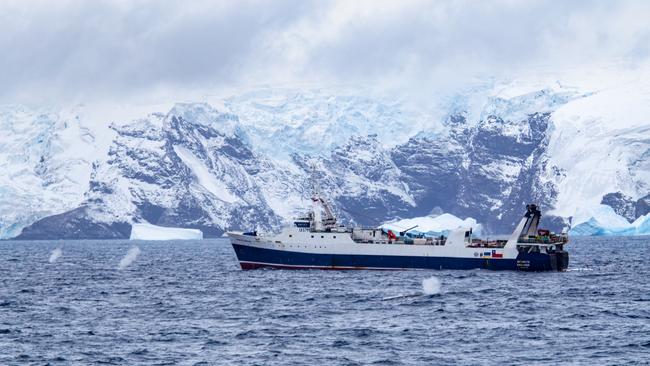Nufarm hits gold with plant-based fish oil substitute as Peru mulls axing anchovy season
As the world’s fish stocks come under pressure, agriculture group Nufarm is set to be rewarded for its canola omega-3 oil - a market set to be worth almost $1bn in a few years.

If Nufarm chief executive Greg Hunt needed further validation about the company’s dive into a plant-based fish oil substitute it came on Tuesday from the other side of the Pacific Ocean.
Peru’s Production Minister Raul Perez-Reyes warned the nation – which supplies about 20 per cent of the world’s fishmeal – could cancel its anchovy season, citing a high volume of juvenile fish.
The move comes amid a tightening of wild fish catch quotas and it couldn’t come at a better time for Nufarm and its Aquaterra product – a fish-free omega-3 oil produced from canola.
It’s a market that Mr Hunt estimates will generate $850m in earnings before interest and tax annually by the end of the decade if total supply came from Nufarm. This compares with the company’s market value of $2.3bn.
Wild fish catches – the current primary source of omega-3 – are dependent on quotas, which Mr Hunt says are unlikely to increase, or in the case of Peru entire seasons potentially cancelled.
Fishmeal is also an important feed source in commercial fish farming – a market Nufarm supplies with Aquaterra. Already, Australian salmon producers have attracted criticism after they confirmed using Antarctic krill in fish feed – a practice that has encroached on whale foraging and snaring whales as bycatch.
“As fish farming grows, the human population grows and the demand for omega 3 grows in all of those segments, the ability for those segments to be met by wild fish catch … assuming this demand continues at current rates to 2032 there will be a deficit of about a million tonnes,” Mr Hunt says.
“Fish oil prices today range from depending on the segment $US2500 ($3755) per metric tonne to $US3500 or $US4000. So the delta at scale … if you were to supply 100 per cent of the market in 2032 will be $850 a tonne or $900 a tonne, and that’s where you get the $850m EBIT potential.”

Nufarm has been steadily gaining traction in its omega-3 canola, which the CSIRO developed a decade ago, with Nufarm securing the commercialisation rights.
The company is supplying major fish farmers in Chile and has lodged a regulatory submission to gain access to the Norwegian salmon market, which accounts for 50 per cent of global production. Analysts expect the product to start generating “meaningful” earnings for Nufarm in FY24.
“Most people think they get omega-3 from fish and they do but the original source of omega-3 is actually from algae. We have basically inserted an omega-3 trait into canola so that now you can grow canola crops that are enriched with long chain beneficial fatty acids or omega-3 oils.
“If we can’t rely on wild fish stocks to generate omega-3 for human health and for fish farming … then yields drop, mortalities increase so you need to find a source of omega-3, and this is what this technology does. It’s Australian technology that has been commercialised globally.”
Fish accumulate high levels of Docosa-hexaenoic acid (DHA) a long-chain omega-3 oil, which is a key structural component of cellular membranes in the human body. According to the CSIRO, DHA is vital for childhood growth, brain and eye development, as well as reducing blood pressure, the risk of coronary heart diseases and strokes as well as type 2 diabetes, Alzheimer’s, inflammatory disease and asthma.
“Some land-based plants, like flaxseed, can produce short-chain omega-3 oils, but are unable to produce the more beneficial long chain omega-3 oils containing DHA,” the CSIRO says.
“Fish, the world‘s primary source of dietary omega-3 oils, do not create their own DHA, they acquire DHA when they eat microalgae. As demand for omega-3 oils continues to grow faster than can be sustainably supplied from wild fish stocks, the race is on to find potential new sources which can satisfy burgeoning consumer demand.
“We have shown that it is possible to produce canola oils containing the same long chain omega-3 oils found in fish oil, and at levels that are commercially viable.”

Mr Hunt is looking beyond supplying commercial fisheries with omega-3 produced from canola. As it grows in scale it has the potential to stabilise and grow the company’s earnings, not to mention its share price which has been battered by two years of drought.
“Hopefully, in the near future, you’ll be able to buy omega-3 encapsulated tablets here in Australia. And then from there you get into things like food ingredients, baby formula and other food ingredients.
“And you get high enrichment … so it’s got higher concentrates of omega-3 and then those products get targeted at the pharmaceutical market. It’s an incredible technology and we think it’s got enormous potential.
“As we grow our platform and our size, we become a lot more attractive to larger funds because they have quite a large sustainability angle. We certainly tick that box and it does provide more resilience to the quality of our earnings.”
But like the company’s foray into biofuel with its Carinata cover crop product, Mr Hunt says omega-3 does not stray from Nufarm’s crop protection business.
“There are synergies between the crop protection products … because these (omega-3 and biofuel) crops still have weeds, pests and diseases that attack these crops in the same way as they do to food crops.
“So farmers need tools to be able to use to protect their crops against pests, weeds and diseases to maximise their yield. And that’s important because we don’t have any more new land, so we’ve got to more out of what we’ve got.”

Morgans analyst Belinda Moore said if Nufarm’s Nuseed business gained access to the Norwegian salmon market, it would “represent a material opportunity for the company”.
“Norway is the world’s largest aquaculture market. In 2023, Nuseed is on track to produce 16,500t of oil which will underpin its sales in FY24,” Ms Moore said.
“(Nufarm’s) seed technologies, mainly Omega-3 and Carinata, is forecast to generate $600-700m of revenue by FY26.”
Nufarm’s share price has been hovering around $5.30 to $6.06 in the past month and UBS analyst Evan Karatzas said it “presents an attractive entry point to gain leverage to the solid global agriculture cycle as well as the significant upside from successfully ramping up the omega-3 and bioenergy (Carinata) seeds platforms”.
“These seed growth platforms drive our forecasted five-year EPS (earnings per share) CAGR (compound annual growth rate) of 10 per cent,” Mr Karatzas wrote in a note to investors.
Maquarie was also upbeat on the company. “We expect rapid growth over FY24-26. Incrementally positive news re omega-3 with the Norwegian positive risk assessment of Aquaterra for use in fish feed and Peru fish quota reduction,” Macquarie analysts said.
“We expect meaningful omega-3 and carinata earnings contribution from FY24 as NUF achieves scale in these products”.




To join the conversation, please log in. Don't have an account? Register
Join the conversation, you are commenting as Logout